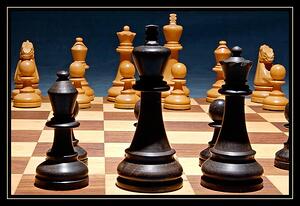by Rich Mesch
I first started talking to busi nesses about using games to improve performance way back in 1985. Back then, I was working mostly with mid-level and senior mangers, so talking about games required hushed tones and euphemisms. After all, busy important managers couldn’t spend time playing games. They had big, big decisions to make. And so what if the game was designed to help them be even more effective in making those big, big decisions? This was serious business. They weren’t games; they were “experiences,” or “competitions,” or “challenges.” Or maybe you just didn’t talk about it at all.
nesses about using games to improve performance way back in 1985. Back then, I was working mostly with mid-level and senior mangers, so talking about games required hushed tones and euphemisms. After all, busy important managers couldn’t spend time playing games. They had big, big decisions to make. And so what if the game was designed to help them be even more effective in making those big, big decisions? This was serious business. They weren’t games; they were “experiences,” or “competitions,” or “challenges.” Or maybe you just didn’t talk about it at all.
What a difference a couple of decades make. We no longer have to apologize for using games for performance, and there are a few organizations that actually champion them. But we’re not out of the woods yet. With many organizations, the business case for games as a performance improvement method remains to be made. And even in organizations that support games, there is still the question of how to design and implement effectively.
In this series, we’ll look at several aspects of gaming for performance, including:
Up first: in the next post in the series, we’ll look at 5 reasons games are an effective performance improvement method. See you then!
I first started talking to busi
 nesses about using games to improve performance way back in 1985. Back then, I was working mostly with mid-level and senior mangers, so talking about games required hushed tones and euphemisms. After all, busy important managers couldn’t spend time playing games. They had big, big decisions to make. And so what if the game was designed to help them be even more effective in making those big, big decisions? This was serious business. They weren’t games; they were “experiences,” or “competitions,” or “challenges.” Or maybe you just didn’t talk about it at all.
nesses about using games to improve performance way back in 1985. Back then, I was working mostly with mid-level and senior mangers, so talking about games required hushed tones and euphemisms. After all, busy important managers couldn’t spend time playing games. They had big, big decisions to make. And so what if the game was designed to help them be even more effective in making those big, big decisions? This was serious business. They weren’t games; they were “experiences,” or “competitions,” or “challenges.” Or maybe you just didn’t talk about it at all.What a difference a couple of decades make. We no longer have to apologize for using games for performance, and there are a few organizations that actually champion them. But we’re not out of the woods yet. With many organizations, the business case for games as a performance improvement method remains to be made. And even in organizations that support games, there is still the question of how to design and implement effectively.
In this series, we’ll look at several aspects of gaming for performance, including:
- The reasons that games are an effective performance improvement methodology for almost all audiences—even senior executives. Especially senior executives.
- Some common myths about gaming; your audience may be more receptive to games than you think; and getting a great game experience doesn’t have to be hard.
- Aspects of effective learning games; there’s a good reason why some people are still talking about the experience months and even years afterwards.
- Types of games; computer-based games are great, but technology isn’t the solution to every challenge. Think you’re too grown up for tokens, cards, and dice? Think again.
Up first: in the next post in the series, we’ll look at 5 reasons games are an effective performance improvement method. See you then!


